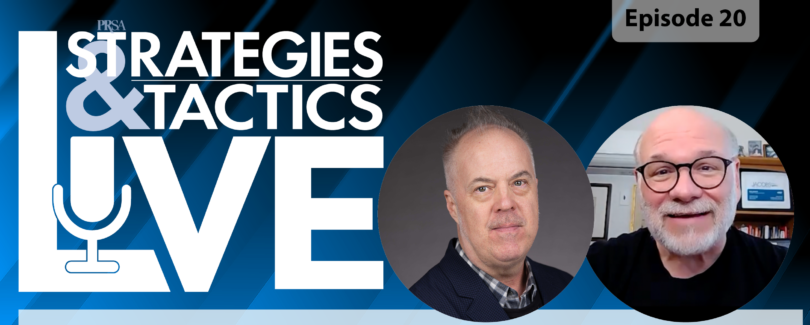After working in public relations for more than 25 years and then becoming a leadership consultant and trainer, Ken Jacobs knows that the PR profession often promotes people into management and leadership “because they’re good at PR, they’re good with media, they’re good with clients and new biz. But leadership is a different set of skills.”
Jacobs, principal of Jacobs Consulting & Executive Coaching, was the guest on Sept. 28 for Strategies & Tactics Live, PRSA’s monthly livestream series on LinkedIn that further explores topics from PRSA’s award-winning publication, Strategies & Tactics. Since 2014, Jacobs has written the paper’s “Taking the Lead” column, which features Q&A interviews with PR leaders.
John Elsasser, editor-in-chief of Strategies & Tactics and host of S&T Live, asked Jacobs to name some of the leadership takeaways he has gleaned in nine years of writing for the publication.
Different leaders offer different insights, but Jacobs advises PR leaders to “hire good people and get out of the way. Spend time articulating a vision and people’s roles in achieving that vision.”
It’s important to have “trust with, and respect for, anyone you want to lead, anyone you want to follow you,” Jacobs said. “Create the strategy, but then you’ve got to do the work to get everyone on board.”
Listening and empathy are other leadership traits, Jacobs said, along with “supporting your people, and giving them space to grow and to ‘fail,’ which we always put in air quotes.”
To be a strong leader, hire people with skills and views that are different than your own, he recommends. “We need all kinds of diversity, including diversity of thinking,” Jacobs said. “You want to have some shared, core values between the leader or the organization and the team members, but you’ll benefit from people who sees things differently than you.” At the same time, leaders should seek out team members who have complementary strengths, he said.
Moreover, “Leaders are responsible to drive DE&I, to not be an observer,” Jacobs said. “It is both the right thing to do, and I think, in 2023-2024, it is a business imperative.”
Sometimes, being ethical means losing clients.
When trying to please and retain clients, adhering to ethical practices “can create some sticky business situations,” Jacobs said. “But it’s so important to hold to those ethical practices. Your values become more important during sticky situations.”
Elsasser asked how leaders can develop their “emotional intelligence” — the ability to manage your own emotions and to understand the emotions of those around you.
“Of all the leadership skills, I truly believe developing your emotional intelligence is the most important thing you can do, especially during uncertain times,” Jacobs said. “People choose whom they follow. It all starts with respect.”
For all leaders, “energy is contagious,” he said. “Mindset is contagious. Positivity, if you choose it, can be contagious. Optimism is contagious.” Uncertain or challenging times, he said, “are an opportunity for growth.”
You can watch the playback of the conversation on LinkedIn.







